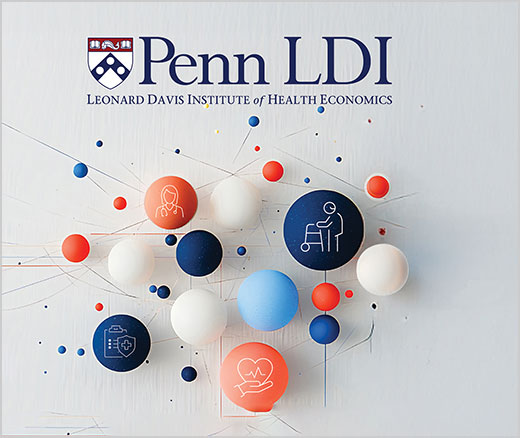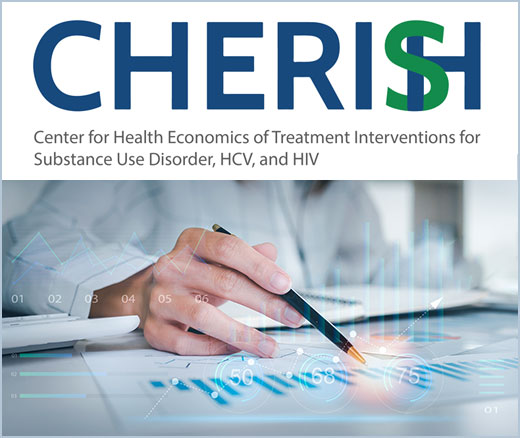
In the Loop or On the Loop: The Conundrum of AI Clinical Decision Support
2025 Penn Nudges in Health Care Symposium Focuses on the Human-Machine Interface
News | Video
The controversial issue of private equity health care acquisitions was the subject of a University of Pennsylvania Leonard Davis Institute of Health Economics (LDI) March 3 virtual seminar that brought together top financial and health care experts to explore the issue further.
Panel moderator and LDI Executive Director Rachel M. Werner, MD, PhD, explained that in 2010, there were 325 private equity deals in U.S. health care. But by 2021, that number had soared to well over a thousand deals.

Private equity is a leveraged buyout (LBO) investment strategy that takes over a company like a steel plant, furniture manufacturer, grocery chain or hospital, and then greatly increases the target organization’s debt to finance the internal reorganization and expansions needed to increase the future sale value. The issue in the health care sector is whether this type of investment, which works well in manufacturing and retail sales, is well suited for organizations whose product is patient care.
“Patients, health care providers, and policymakers are concerned about what the short-term private equity financial incentives are and how they might shortchange patients, result in consolidation in the health care markets, increase care costs, and perhaps worsen patient outcomes,” said Werner.
The four panelists and researchers who were asked to provide their assessment of how private equity impacts patient care were Atul Gupta, PhD, LDI Senior Fellow and Assistant Professor of Health Care Management at The Wharton School; Sabrina Howell, PhD, Associate Professor of Finance, NYU School of Business; Ryan McDevitt, PhD, Professor of Economics at Duke University; and Brian Powers, MD, MBA, Vice President for Clinical Strategy at Humana.

Howell, a Faculty Research Fellow at the National Bureau of Economic Research and a Research Fellow at the Private Equity Research Consortium, explained, “Private equity firms are basically more responsive to competitive and financial incentives than other types of firms. Whether customers are better off after an acquisition depends on the incentive structure of the particular market. We know unambiguously that private equity ownership increases productivity, but whether the operational changes are good for consumers—in this case, patients—depends on whether incentives to maximize profit are structured to be well aligned with consumer interests. I’ve [studied] for-profit colleges, nursing homes, local newspapers, and airports. And for the first three, I find evidence of adverse effects of private equity ownership along at least some dimensions.”
Gupta, an applied microeconomist with research interests in health economics, public economics, and industrial organization, discussed his nursing home study findings in relation to private equity acquisitions.

“Our headline result was that, unfortunately for Medicare patients who account for about 60% of all patients that pass through nursing homes, short term mortality within 90 days of discharge from the nursing home goes up by about 10%,” Gupta said. “In addition, we also found adverse effects on other measures of patient well-being. For example, scores on mobility, ulcers, and pain. We find a coherent, consistent picture of patients doing worse after the nursing home is bought by private equity. We also see evidence that the nursing home spending goes up for Medicare by about 6-8%.”
Werner pointed out that studies of nursing homes during the COVID-19 pandemic found that private equity-managed institutions fared better than nursing homes that weren’t involved in private equity at the time.
“The nursing homes owned by private equity in 2021 might be quite different than nursing homes during our sample period prior to the pandemic,” said Gupta “We have to think about COVID-19 as a slightly different time frame in the sense that there was a lot of scrutiny on nursing homes for obvious reasons. And we know that private equity firms respond to competition and probably also responded to greater scrutiny. And so, it’s perfectly understandable why, during a period where there was a lot of scrutiny on nursing home performance, private equity-owned nursing homes actually did a better job in some dimensions.”

McDevitt, editor of the Journal of Industrial Economics, noted that “despite a lot of recent headlines about bankruptcies in private equity-acquired acute care hospitals, the data don’t actually support that narrative. There’s not a widespread financial instability after the acquisition. In some of our own work, on average, these hospitals actually improved their financial performance after being acquired by a private equity fund, and they did it by both reducing costs and increasing revenue. There seems to be this odd tension between policymakers wanting to bend the cost curve by making hospitals more efficient. But then they seem to be vilifying private equity firms when they do just that.”
“On the technology side,” McDevitt continued, “Medicare’s made it virtually impossible to remain viable without scale. The reimbursements are pretty skimpy. The administrative burdens are quite high. And so, you need scale to be viable. And that’s one thing that private equity can provide.”
Powers, editor of Healthcare: The Journal of Delivery Science and Innovation, said Humana “has concerns and questions over the extent to which the affordability of care for its members is impacted by private equity investment. There are pockets of concern around poor outcomes for individuals in our case, for our Medicare, Advantage, or Medicaid, or commercial beneficiaries, or for higher costs that may occur without a commensurate increase in quality. But there may also be pockets where that is less of a concern. We do have partnerships with primary care organizations that have been able to grow to serve more seniors largely through private equity financing.”

“Access to growth capital does allow innovative businesses to scale more quickly,” continued Powers. “Traditional sources of capital, whether it’s public markets or private debt markets, creates some capacity constraints that growth capital might overcome. So, I think that’s one dimension of potential private equity benefits that I don’t think is necessarily discussed as often.”
Werner asked about the impact of private equity investment strategies on health care market consolidation—a trend known to have a negative impact on costs and patient care.
Howell explained that a common private equity investment strategy may circumvent antitrust regulations established in the Hart-Scott-Rodino Antitrust Improvements Act of 1976. That federal law requires companies planning merger transactions above a certain threshold to inform the Federal Trade Commission and Department of Justice in advance of the transactions.
“Roll-ups in which a firm buys many of a single sort of small company, or builds an initial platform and then adds onto it other small firms, are really a bread and butter strategy for creating value in private equity,” Howell said. “One by one, each purchase doesn’t hit the Hart-Scott-Rodino threshold as this kind of consolidation occurs over time. This model has been applied to health care in recent years, particularly for physician practices. A motivation for these deals is to reap efficiency gains by reducing back-office costs. That’s not necessarily a bad thing but there is some evidence that physician consolidation is associated with worse Medicare patient outcomes.”
“So, from an antitrust perspective, these kinds of under-the-radar roll-ups might be a problem. If the issue is pulling together many small firms to gain market share and market power, I think private equity and non-private equity should receive the same scrutiny,” said Howell.
Private Equity ventures often involve complex layers of corporate entities that can make it difficult to know exactly who owns what. This has been a particular problem in the nursing home industry and there have been growing calls for federal regulations that require more ownership transparency in health care-related private equity operations.
As the panel approached its end, panelists were reminded that the Biden Administration has recently focused its attention on the role of private equity in health care. Each panelist was asked about the advice they would offer legislators as they contemplated the specifics of new regulations.
McDevitt: “I would emphasize transparency. I wouldn’t separate private equity because we’re not finding any empirical evidence that private equity is different from any other investor. I would make changes to rules, regulations, and reimbursements that affect all corporate providers, even some nonprofit providers.”
Powers: “I’ll echo ‘transparency.’ Another suggestion is measuring and embracing the nuance that comes from research about the areas involving poor outcomes for patients. There should be a focus on outcomes and not inputs.”
Gupta: “Transparency and accountability for outcomes that we care about and then perhaps linking some payments to that to signal that (value-based reimbursement) is coming down the pike and is important.”
Howell: “The incentives in private equity activity need to be aligned with the interests of taxpayers and patients. Private equity has the potential to help reduce soaring costs in some subsectors of health care if the incentives are well aligned.”


2025 Penn Nudges in Health Care Symposium Focuses on the Human-Machine Interface

Former Philadelphia Health Commissioner Warns That Gutting the CDC, Undermining Vaccines, and Politicizing Science Will Leave the U.S. Dangerously Unprepared for the Next Pandemic

Some Hospice Agencies Adjusted Admissions and Discharges to Maximize Payments

New Program Launches Research Initiatives Focused on Improving Primary Care for Older Adults

Rural Parents Had More Emergency Visits and Insurance Loss Than Urban Peers, an LDI Study Shows. Integrated Baby Visits Could Help All Parents Be Healthier

Penn and Four Other Partners Focus on the Health Economics of Substance Use Disorder